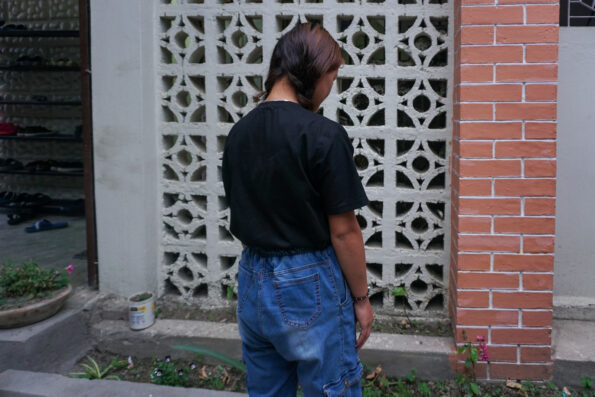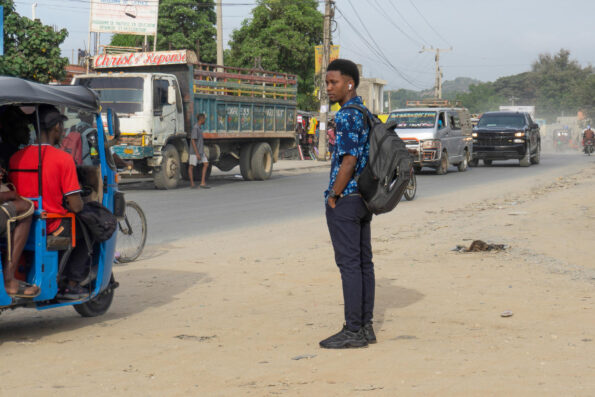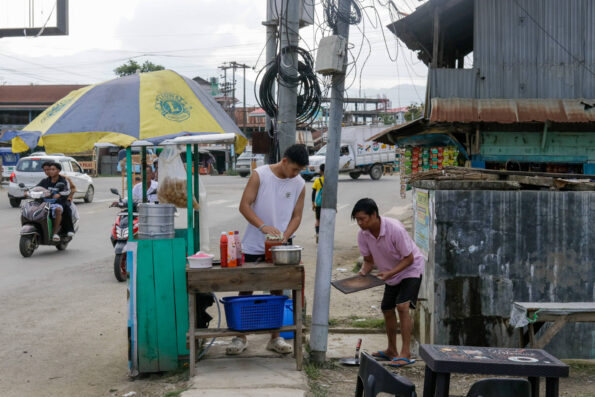
Noella Nyirabihogo, GPJ DRC
Aline Kwizerimana, a Burundian refugee living in Lusenda camp in Democratic Republic of Congo, receives $10 in aid monthly, which she and her six children must use to buy food.
LUSENDA, DEMOCRATIC REPUBLIC OF CONGO — The refugees hadn’t received cash assistance in months. But on this bright morning, hundreds of men, women and children scurry toward a tent at the center of the camp. There, the refugees, all from Burundi, shout over one another as aid workers hand money to those whose names are on a list.
Among the lucky ones is Aline Kwizerimana, 48, a mother of six who fled Burundi in October 2015.
“My children and I are working at the local farms so we can earn some food and survive,” says Kwizerimana, a shy woman with a wan smile.
Like refugees worldwide, the residents of this camp in Lusenda, a town in South Kivu province in eastern DRC, have seen their lives upended by the coronavirus pandemic. Cash aid arrives every few months, if at all. Refugees now scarcely receive health care. Tensions with locals have heightened. Families go days without food.
Desperate, some refugees want to return to Burundi, despite ongoing political violence.
“We’d rather go back home, even if we don’t know what we’ll find there,” says Jean-Damascène Kubwimana, a Burundian refugee from the Lusenda camp. “It’s better than staying here and dying of starvation.”



The crisis at Lusenda camp isn’t unique to DRC. The United Nations World Food Programme and the United Nations High Commissioner for Refugees reported last year that underfunding during the pandemic threatened food aid to refugees in several countries, including Ethiopia, Kenya, South Sudan, Tanzania and Zambia.
“While the situation continues to deteriorate for everyone, the disaster is magnified for refugees, who have absolutely nothing to cushion their fall,” World Food Programme executive director David Beasley said last year in a statement.
The pandemic has taken an outsized toll on refugees globally, says a report by the Danish Refugee Council, a private humanitarian group whose mission includes advocating for and protecting refugees. It found, among other things, that restrictions designed to arrest the coronavirus deprived refugees of work, education and psychosocial services, and had a particularly negative impact in camps.
Didier Numbi, the Lusenda representative for DRC’s National Commission for Refugees, the government agency that protects refugees and handles asylum applications, says partner states and organizations have struggled to mobilize resources.
“It’s a bitter reality that the United States, one of the major donors, has been hit the hardest by the coronavirus pandemic,” Numbi says. “As a result, resources that the country had initially planned to send to refugees have now been allocated to support domestic relief instead.”
More than 300,000 Burundian refugees are scattered throughout east and central Africa, mainly in Uganda, Tanzania, Rwanda and DRC. Most escaped a homeland beset by political repression and economic instability, which followed an attempted coup in 2015, according to a report by the International Crisis Group, an organization that provides analysis and information aimed at preventing war and other conflict.
Around 50,000 refugees live in DRC, which borders Burundi to the west. About 30,000 settled in the Lusenda camp.
At the camp, compact brick houses shelter the refugees. People come and go. Children ferry firewood on their heads, and men and women shoulder hoes to work in fields outside the camp. Others return with small baskets of food.
At the entrance, government health workers do temperature checks and ensure that people wash their hands.
Coronavirus directives have hampered refugees’ freedom of movement, which means they are no longer allowed to go out into surrounding communities to find work. (They try anyway.)
Last January, refugees marched to Kavimvira, on the DRC-Burundi border, to request repatriation, condemning the poor conditions in the camps. In early April, Okapi, the radio outlet of MONUSCO, the U.N.’s peacekeeping mission in DRC, reported that UNHCR had repatriated 239 Burundian refugees. UNHCR plans to send some 143,000 back to Burundi this year.
Refugees would be returning to a country where, since the 2020 elections, Human Rights Watch, a New York-based research and advocacy group, has received reports of killings, disappearances, arbitrary arrests, threats and beatings of real or perceived opposition members.
If the DRC government can’t take better care of refugees, then they want to be “officially repatriated to our country in the safest possible way,” says Felix Cimpaye, a Burundian refugee who manages the Lusenda camp.



Cimpaye says acts of theft by young refugees against residents of Lusenda town have drained the community’s patience and trust.
“Tensions escalated from the moment the livelihoods of the refugees in the camp were heavily disrupted,” he says. “People are struggling to find food, and some resort to stealing food supplies from the nearby fields.”
At the same time, muddy, potholed roads leading into the camp have caused lengthy delays in getting food and medical aid to the refugees. Pills, medical gloves, and syringes are all in short supply, and refugees are forced to buy them from outside pharmacies. Those who can’t afford to do that simply go without.
Refugees say they used to receive $15 a month before the pandemic; now it’s $10 – and that’s often late. In April, Kwizerimana earned 5,000 Congolese francs (about $2.50) doing odd jobs outside the camp. It fed her family for a week.
On many nights, Kwizerimana says, her children, ages 6 to 17, can’t eat. As evidence, she points out her makeshift kitchen, where cooking utensils supplied by the camp sit clean and neatly stowed away. She has rarely used them.
Noella Nyirabihogo is a Global Press Journal reporter based in Goma, Democratic Republic of Congo. She specializes in covering peace and security.
TRANSLATION NOTE
Emeline Berg, GPJ, translated this article from French.






